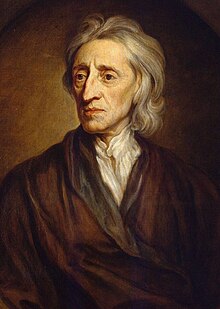
Back John Locke Afrikaans John Locke ALS ጆን ሎክ Amharic John Locke AN John Locke ANG جون لوك Arabic دجون لوك ARY جون لوك ARZ John Locke AST Con Lokk Azerbaijani


John Locke [] (* 29. Augustjul. / 8. September 1632greg.[1] in Wrington bei Bristol; † 28. Oktoberjul. / 8. November 1704greg.[1] in Oates, Epping Forest, Essex) war ein englischer Arzt sowie einflussreicher Philosoph und Vordenker der Aufklärung.
Locke gilt allgemein als Vater des Liberalismus.[2][3][4] Er ist zusammen mit Newton[5][6] und Hume der Hauptvertreter des britischen Empirismus[7][8][9] und war der Auffassung, dass alle Erkenntnis allein auf Erfahrung beruhe. Des Weiteren ist er neben Thomas Hobbes (1588–1679) und Jean-Jacques Rousseau (1712–1778) einer der bedeutendsten Vertragstheoretiker im frühen Zeitalter der Aufklärung.
Seine politische Philosophie beeinflusste die Unabhängigkeitserklärung der Vereinigten Staaten, die Verfassung der Vereinigten Staaten, die Verfassung des revolutionären Frankreichs und über diesen Weg die meisten Verfassungen liberaler Staaten maßgeblich. In seinem Werk Two Treatises of Government argumentiert Locke, dass eine Regierung nur legitim ist, wenn sie die Zustimmung der Regierten besitzt und die Naturrechte Leben, Freiheit und Eigentum beschützt. Wenn diese Bedingungen nicht erfüllt sind, haben die Untertanen ein Recht auf Widerstand gegen die Regierenden.
- ↑ a b Grabtafel von 1705: ... That he was born on the 29th of August in the year of our Lord 1632, and that he died on the 28th of October in the year of our Lord 1704, this tablet, which itself will quickly perish, is a record. See also: R. Woolhouse, Locke. A Biography, NY 2007, S. 1.
- ↑ Locke, John. A Letter Concerning Toleration Routledge, New York, 1991. p. 5 (Introduction)
- ↑ Delaney, Tim. The march of unreason: science, democracy, and the new fundamentalism Oxford University Press, New York, 2005. p. 18
- ↑ Godwin, Kenneth et al. School choice tradeoffs: liberty, equity, and diversity University of Texas Press, Austin, 2002. p. 12
- ↑ Die verschiedenen methodologischen Einflüsse Newtons auf Locke und den englischen Empirismus sind ein kontroverser Gegenstand der aktuellen Wissenschaftsgeschichte. Siehe dazu etwa Z. Biener, E. Schliesser (Hrsg.), Newton and Empiricism. Oxford 2014.
- ↑ Siehe A. Janiak, Newton’s Philosophy (2021). Online-Veröffentlichung in Stanford Encyclopedia of Philosophy (Zugriff am 23. Juli 2024). Darin ist von einer anachronistischen Rolle Newtons im Kontext des Empirismus die Rede.
- ↑ Zurückgehend auf I. Kant, Kritik der reinen Vernunft, zweite Auflage 1787. Akademie-Ausgabe Band III, Berlin 1904, B 882, wird der Empirismus, als erkenntnistheorische systematische Position der Neuzeit, originär Locke zugeschrieben. Siehe dazu insbes. V. Kraft, Empirismus. In: Historisches Wörterbuch der Philosophie, Bd. 2, S. 478. Basel 1971–2007.
- ↑ M. Fasko, P. West, British Empiricism. In: Internet Encyclopedia of Philosophy (Zugriff am 23. Juli 2024).
- ↑ H. Delius, Positivismus und Neopositivismus. In: A. Diemer, I. Frenzel (Hrsg.), Philosophie. (Fischer) Frankfurt am Main 1958, Seite 270 f.